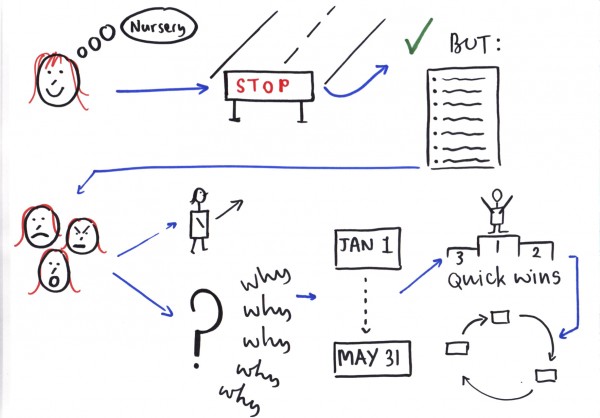As I mentioned in the last post, I use Cliniko to manage my appointments, invoices and case notes. This is the only online practice management software I’ve tried and it’s working for me. I use it on my desktop computer at home, and my phone and iPad when I’m out and about, which means I always have my client files with me. Continue reading
Tag Archives: service development
Becoming Independent: how to promote an independent SLT practice

People have asked me how I advertise my practice. When I ask clients how they found me about half say someone they know recommended me. Some tell me they found me via the ASLTIP directory, and the rest searched google and found my website.
Encourage Personal Recommendations
Happy clients tell their friends! I’ve worked with a former client’s next door neighbour, been contacted by a woman who said her sister’s friend suggested me, and had parents recommended me to their child’s classmates. Continue reading
Using “yes, and…” to facilitate change

I’m in a transition phase; I’ve left my NHS role and started work as an independent therapist. I find change tricky. I had an interesting conversation with Abi Roper and Tom Starr-Marshall that made me think — why is change in the NHS so difficult? And in a solution-focused kind of way, what makes particular projects successful?
Looking back, there was a pattern to my attempts at service development (try and follow along with the diagram!):
Continue reading
Drawing a new map in speech and language therapy—thoughts from Seth Godin’s “Linchpin”
I’ve just finished reading Seth Godin’s Linchpin and his message resonated with me. Godin asks readers to make a choice and then share his ideas, so here goes!
Godin describes a linchpin as “an individual who can walk into chaos and create order, someone who can invent, connect, create and make things happen… linchpins are geniuses, artists and givers of gifts.” He says that although we were trained to be cogs in a giant machine, we can choose to re-train ourselves to become indispensable.
Linchpins don’t wait for instructions, they make their own maps. They overcome the resistance (the lizard brain that tells us our ideas will never work and everyone will laugh at us) and get their ideas out into the world.
In a recent team meeting at work, it was easy to see the therapists whose lizard brains were in control; they suggested we stop trying new ways of working and go back to the old way! Fortunately my team also has a linchpin or two; they’re generous with their gifts and keen to make change. I’m trying to be a linchpin too; we’re starting to draw our own map, overcome the resistance, and ship our ideas.
I recommend checking out the Linchpin Manifesto (PDF link) and reading the book. We need more linchpins in the National Health Service! What do you think?
Reflecting on an old job & moving to a new one
I recently left a job in one London borough to start a new one in another part of the city. The aim of the move was to find a job that would allow me to develop my supervision skills, and get involved with service development work, while continuing to progress my clinical skills.
The change made me reflect on the positive aspects of the old job, so I’m jotting them down here.
Positives
It was a large, friendly team of therapists and I was well supported. I worked autonomously: free to manage my own time and workload.
I spent 18 months working with the same caseload, so I was able to get to know the families. When we met in the street, they would stop and chat; I felt a part of the community. I was also able to develop good working relationships with other professionals, such as staff in the Children’s Centres.
The team has a good universal service in place; they are working at the population level to raise awareness and prevent difficulties arising. In this respect they’re ahead of many other boroughs!
We were encouraged to carry out clinical projects, so I developed a drop-in group focussing on parent child interaction strategies, in my patch. With support from the Children’s Centre I was able to grow this group and access hard to reach families.
What I’m looking forward to
I think the new job will also be a positive experience; when I’ve moved through the initial ‘information overload’ phase and begin to find my feet, I hope I will enjoy the new challenge. I’m looking forward to developing the universal service and working with nursery settings.
I find starting in a new team difficult and admire locum therapists, who move from team to team regularly—I wouldn’t cope! If you’ve got any tips about how to make the transition as stress-free as possible, please add a comment!
